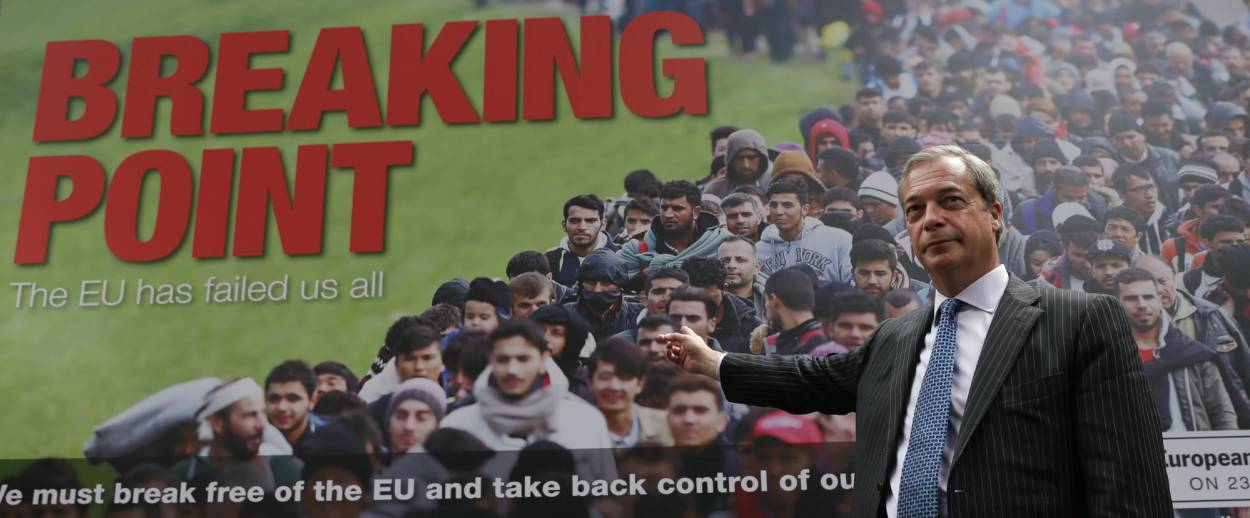Nigel Farage, UKIP’s Trumpian Leader, Wants His Country Back
As the Brexit vote nears, an increasingly xenophobic, anti-immigrant discourse has emerged




Last Thursday morning, UK Independence Party (UKIP) leader Nigel Farage proudly unveiled his party’s latest European Union referendum campaign poster. “BREAKING POINT,” screeched the billboard, “The EU has failed us all.” Pictured behind Farage was a long, snaking line of migrants and refugees, presumably headed straight for Britain’s shores.
That afternoon, Labour MP Jo Cox was murdered; the accused gave his name in court as “Death to traitors, freedom to Britain.” Writing in The Spectator, Alex Massie wrote, “When you shout BREAKING POINT over and over again, you don’t get to be surprised when someone breaks. When you present politics as a matter of life and death, as a question of national survival, don’t be surprised if someone takes you at your word. You didn’t make them do it, no, but you didn’t do much to stop it either.”
The “breaking point” slogan, with its echoing of Nazi propaganda, was the most patent expression of an increasingly xenophobic, anti-immigrant discourse perpetuated by those who argue Brexit would allow Britain to leave behind the free movement of people and “take back control” of our borders. Once it became clear they had no economic case to make, Leave campaigners—both the official Vote Leave campaign led by Boris Johnson and Michael Gove, and Farage’s various unaffiliated groups—shifted focus. Out came the threat that, one day soon, 76 million Turks will descend upon us and we’re powerless to stop them. “The birthrate in Turkey is so high,” Vote Leave’s Penny Mordaunt said. “Crime is far higher in Turkey than the UK.”
It was as if to say: If you don’t want a Turkish criminal for a neighbor—or an Albanian for that matter—you better vote to get out.
The “breaking point” referendum is the culmination Farage’s political career; he’s been a member of the European Parliament since 1999. Having tried and failed seven times to get elected to Westminster, he may never come as close again to seeing his dystopian vision of Britain outside of Europe realized.
Identified in school as someone who “publicly professed racist and neo-fascist views” and once “marched through a quiet Sussex village very late at night shouting Hitler-youth songs,” Farage has used his megaphone to say that Enoch Powell was basically right about immigration; that he feels “awkward” sitting on a train hearing people speak foreign languages; that people who are HIV-positive shouldn’t be allowed to settle in Britain; that he’d be concerned if “a group of Romanian men moved in” next door to him; and that some Muslims are “a fifth column living within our country, who hate us and want to kill us.”

Farage is like Trump with an English accent and a double-breasted jacket. Like U.S. presidential hopeful, Farage does not address the working class; instead he stokes their fears by talking about immigrants in the most vile and dehumanizing manner in order to further his own sordid agenda. Like Trump, Farage is a crybully, adept at playing the victim.
Last Sunday, after ITV’s Robert Peston suggested to Farage that Cox’s death “has prompted a debate about whether there is too much hatred in political life,” Farage said: “I think I’ve been a politician that has been a victim of it to be honest with you.” Later, referring to the Leave campaign, he added, “I think we had momentum before this terrible tragedy.”
Reported the BBC:
On LBC radio, Mr Farage said: “I think there are Remain camp supporters out there who are using this to try to give the impression that this isolated horrific incident is somehow linked to arguments that have been made by myself or Michael Gove or anybody else in this campaign, and frankly that is wrong.”
A referendum on Europe was a horrible idea to begin with. Division is in the nature of a plebiscite, yet somehow, this campaign has become even worse than one could’ve possibly imagined, as trust in institutions has evaporated while bitterness and anger have seeped in. Communities and families have been cleaved in twain. Nationalists have fashioned themselves as ugly idols and the “other” has become the devil while Farage screams “BREAKING POINT” well after the horse has already bolted.
Liam Hoare is a freelance writer based in Vienna, where he is the Europe Editor for Moment and a frequent contributor to Tablet.